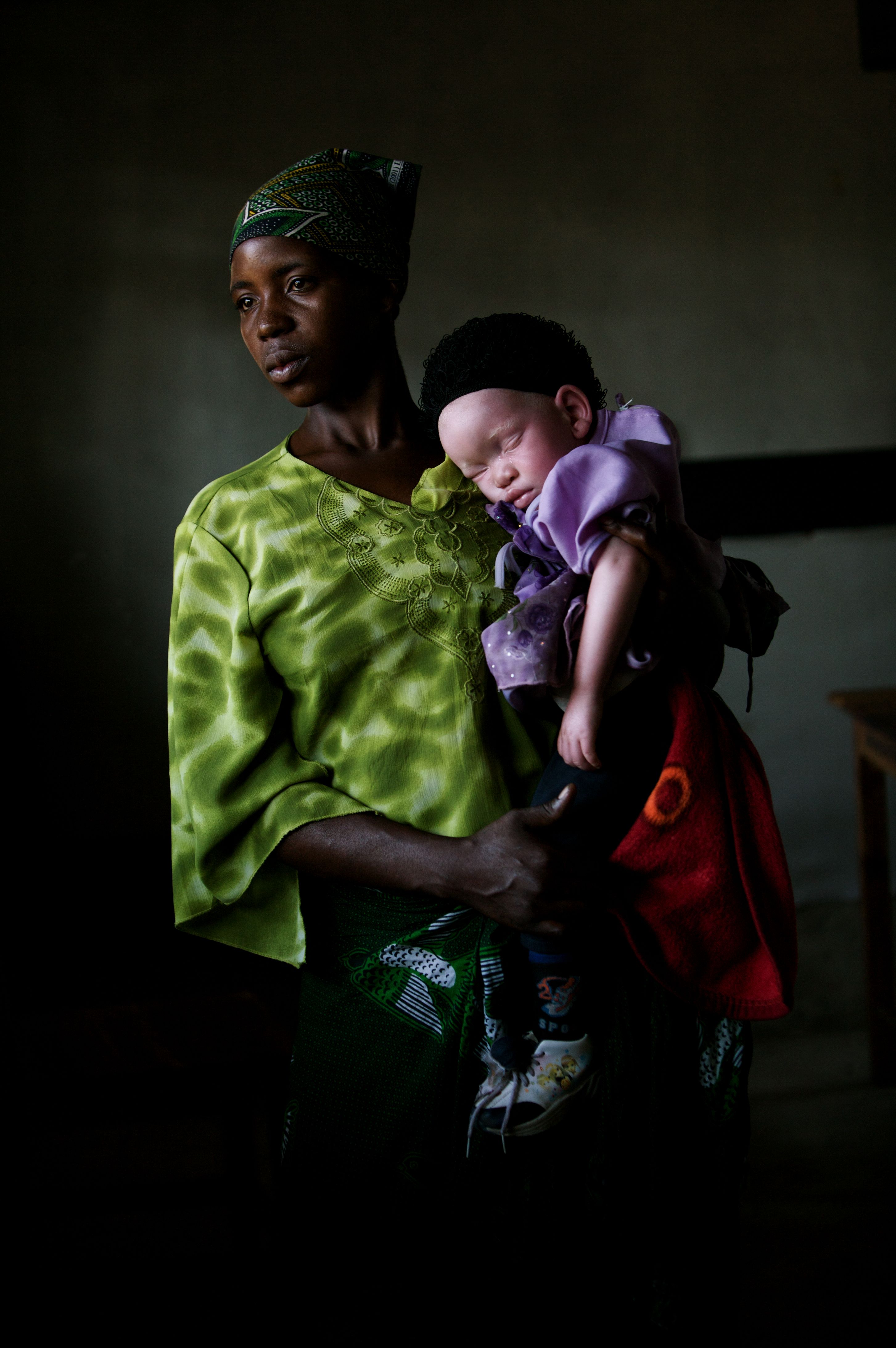“The term albino comes from a Portuguese explorer who, when travelling in Africa, saw both dark and light-skinned natives, and called them "Negroes" (from the word for black) and "Albinos" (from the word for white) - he erred in thinking that they were of different races."
 Life is harsh for thousands of Africans who suffer from albinism. The stigma that surrounds them has been ingrained within society for many generations and throughout their lives they battle with prejudice, social exclusion and isolation. Seen as a curse from God, they are believed to bring bad luck to the households they are born in to. Many are killed at birth or rejected by their families. Albinism is a rare genetic condition occurring in both genders regardless of ethnicity. It is caused by the meeting of 2 recessive genes leading to an absence of the enzyme necessary to produce dark pigment in the skin. This leaves their skin vulnerable to damage - a problem particularly severe in the hot African sun. Without the protective pigment melanin, ultra-violet light penetrates the skin. Africans with albinism are therefore one of the most vulnerable groups in the world to skin cancer - their biggest killer. Lack of knowledge, protective sunscreen, wide brimmed hats and proper clothing are resulting in epidemic rates of death due to this preventable disease. In almost all cases a significant visual impairment is involved, with a high percentage of people with albinism being legally blind. With little or no visual aids and a general lack of understanding of their condition, children with albinism have extreme difficulty in completing their education. This leads to chronic unemployment and results in many having to resort to working outside in the hot sun without any protection. In rural Tanzania it is a belief that people with albinism are not African, leaving those suffering from the condition with little sense of racial identity. Judged by their skin colour alone they are continually de-humanised and ostracised within their communities.
Life is harsh for thousands of Africans who suffer from albinism. The stigma that surrounds them has been ingrained within society for many generations and throughout their lives they battle with prejudice, social exclusion and isolation. Seen as a curse from God, they are believed to bring bad luck to the households they are born in to. Many are killed at birth or rejected by their families. Albinism is a rare genetic condition occurring in both genders regardless of ethnicity. It is caused by the meeting of 2 recessive genes leading to an absence of the enzyme necessary to produce dark pigment in the skin. This leaves their skin vulnerable to damage - a problem particularly severe in the hot African sun. Without the protective pigment melanin, ultra-violet light penetrates the skin. Africans with albinism are therefore one of the most vulnerable groups in the world to skin cancer - their biggest killer. Lack of knowledge, protective sunscreen, wide brimmed hats and proper clothing are resulting in epidemic rates of death due to this preventable disease. In almost all cases a significant visual impairment is involved, with a high percentage of people with albinism being legally blind. With little or no visual aids and a general lack of understanding of their condition, children with albinism have extreme difficulty in completing their education. This leads to chronic unemployment and results in many having to resort to working outside in the hot sun without any protection. In rural Tanzania it is a belief that people with albinism are not African, leaving those suffering from the condition with little sense of racial identity. Judged by their skin colour alone they are continually de-humanised and ostracised within their communities.
Recently this stigmatisation has reached an unimaginable new level. Officially 73 people with albinism have been brutally killed in Tanzania over the past 5 years. This is the number documented by the press and police and the Tanzanian Albino Society believe the number of killings to be much higher. The killings and beliefs have now spread into neighbouring countries. In a society where poverty is rife and this horrific practice is becoming more widespread, people with albinism in Tanzania are currently in constant fear for their lives.
In the USA it is estimated that 1 in 20,000 people have some form of albinism. In Tanzania however, it is 5 times as common with 1 in 4,000 being affected. This issue is global; however the reality of living with the condition in Africa is still widely unknown throughout western cultures.
